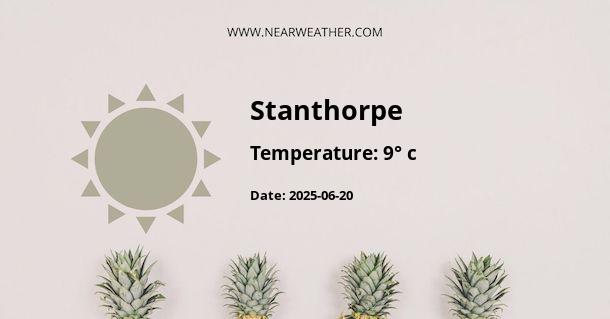Climate and Weather in Stanthorpe, Australia
Stanthorpe is a charming town located in the Granite Belt region of Queensland, Australia. Known for its stunning national parks, vineyards, and apple orchards, Stanthorpe experiences a unique climate that is influenced by its high elevation and proximity to the Great Dividing Range. Let's explore the weather patterns and climate in Stanthorpe throughout the year.
Temperature
Stanthorpe has a temperate climate with warm summers and cool winters. The town's high elevation of around 811 meters (2,661 feet) above sea level contributes to its cooler temperatures compared to the surrounding lowlands.
The summer months of December, January, and February are generally warm and can occasionally reach temperatures above 30 degrees Celsius (86 degrees Fahrenheit). However, due to the town's elevation, summer nights tend to be cooler, providing some relief from the daytime heat.
Winter in Stanthorpe, from June to August, brings chilly temperatures, especially during the night. The average maximum temperature during winter ranges from 12 to 16 degrees Celsius (54 to 61 degrees Fahrenheit), while the minimum temperature can drop below freezing point on some nights. Snowfall is not uncommon in the surrounding areas, adding to the town's picturesque winter scenery.
Rainfall
Stanthorpe experiences a moderate amount of rainfall throughout the year, with a slightly wetter period from November to March. The town receives an annual average rainfall of about 820 millimeters (32 inches), which is relatively higher compared to other parts of Queensland.
The region's rainfall is influenced by the convergence of weather systems from the coast and inland areas. The Great Dividing Range acts as a barrier, causing the moist air from the coast to rise and release precipitation as it reaches higher altitudes. This phenomenon contributes to the higher rainfall in the Stanthorpe area.
The wettest months are typically January and February, with an average rainfall of around 100 millimeters (4 inches) per month. The drier months are June and July, with average rainfall of about 35 millimeters (1.4 inches) per month.
Sunshine Hours
Stanthorpe enjoys a good amount of sunshine throughout the year. On average, the town receives around 2600 hours of sunshine annually, which is higher than the national average for Australia.
The sunniest months are typically from September to November, with an average of 8 to 9 hours of sunshine per day. On the other hand, the winter months of June and July experience slightly fewer sunshine hours, with around 6 to 7 hours per day.
Extreme Weather Events
While Stanthorpe generally experiences mild and pleasant weather, the region is not entirely immune to extreme weather events.
During the summer months, the town can occasionally be affected by thunderstorms, which may bring heavy rainfall, strong winds, and occasional hail. These storms can cause localized flooding and disrupt outdoor activities.
In the winter months, Stanthorpe and its surrounding areas can experience frost and occasional snowfall, particularly in the higher elevations. These cold weather events can impact agriculture and may require special precautions to protect crops and livestock.
Conclusion
Stanthorpe's unique climate and weather patterns make it a fascinating destination for those seeking a change from the typical Australian climate. From warm summers to cool winters, and occasional snowfall, the town offers a diverse range of weather experiences throughout the year. Whether you're exploring the national parks, visiting the vineyards, or simply enjoying the picturesque scenery, Stanthorpe's climate adds to the charm of this beautiful town in the Granite Belt region of Australia.
A - Stanthorpe's Latitude is -28.666670 & Longitude is 151.949997.
A - Weather in Stanthorpe is 9° today.
A - Climate Conditions in Stanthorpe shows clear sky today.
A - Humidity in Stanthorpe is 93% today.
A - Wind speed in Stanthorpe is 9.58 km/h, flowing at 131° wind direction. today.
